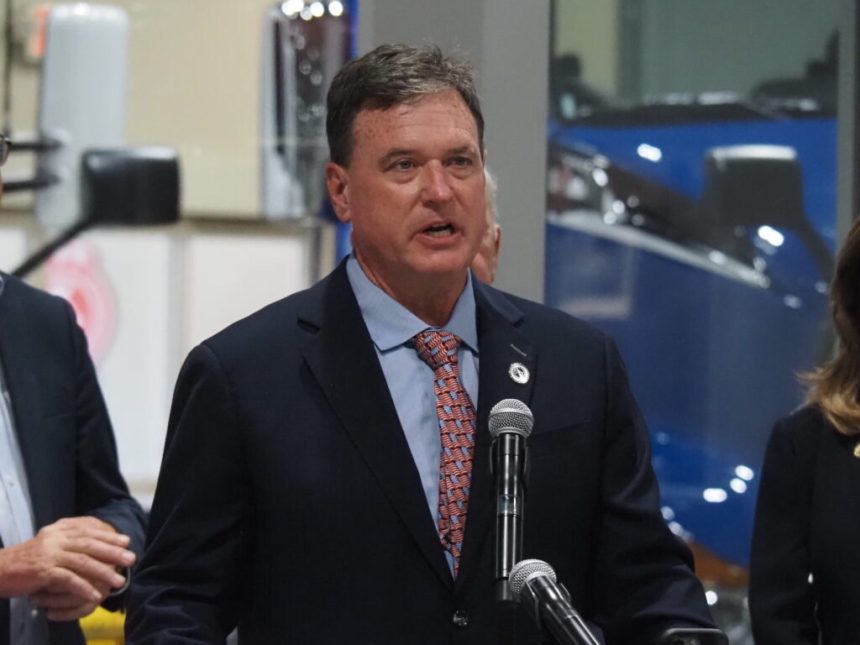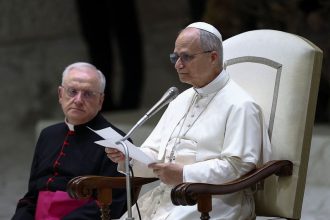Indiana Attorney General Todd Rokita speaks at an environmental deregulation event at an Indianapolis truck dealership on Tuesday, July 29, 2025. (Leslie Bonilla Muñiz/Indiana Capital Chronicle)
In a new filing, Indiana Attorney General Todd Rokita rejected a second disciplinary complaint against him and denied that he contradicted sworn statements to the state supreme court.
The dispute centers around a news release issued by Rokita in November 2023 following an earlier professional conduct investigation that stemmed from comments he made during a 2022 interview with Fox News commentator Jesse Watters.
After Indiana’s high court justices found that he had violated two of the Rules of Professional Conduct for lawyers — and issued a public reprimand — Rokita called the dispute a “failed attempt to derail our work.” He said he had “evidence and explanation” for what he said on air, but chose not to fight the complaint any further to save “taxpayer money and distraction.”
The Indiana Supreme Court Disciplinary Commission filed a new round of charges against him earlier this year, alleging he wasn’t being truthful when he told the court he was accepting responsibility for his actions.
Story continues below.
Rokita answer-to-complaint 0815
In a 24-page response filed Aug. 15 with the Indiana Supreme Court, Rokita’s attorneys wrote that his November 2023 press release about the prior reprimand “was consistent with the conditional agreement and affidavit he signed to resolve the prior disciplinary matter” and that his statements “did not contradict the conditional agreement or affidavit.”
Rokita additionally argued that the complaint itself oversteps legal bounds. His lawyers added that he “vehemently disputes” the disciplinary commission’s charges against him.
“… the disciplinary commission’s Complaint infringes on Attorney General Rokita’s First Amendment free speech rights, violates Indiana’s separation of powers principles, and violates Indiana’s anti-SLAPP statutes,” Rokita’s legal team wrote.
Ongoing disciplinary dispute
The ongoing complaint stems from Rokita’s nationally televised comments in June 2022 about Indianapolis OB-GYN Dr. Caitlin Bernard, who oversaw a medication abortion for a 10-year-old rape victim from Ohio that summer.
In an interview with Fox News commentator Jesse Watters, Rokita called Bernard an “activist acting as a doctor” and suggested that she violated patient privacy and state reporting laws. He said his office was investigating her conduct and would be “looking at her licensure.”
The Indiana Medical Licensing Board ultimately found that Bernard had violated patient privacy laws — resulting in a reprimand and a fine — but she was cleared of failing to report the abortion.
Rokita’s office settled an initial complaint about his comments in November 2023. In a sworn affidavit, Rokita admitted to violating two professional conduct rules in exchange for a public reprimand. A third count was dismissed.
Although he agreed not to contest the charges, the commission found that Rokita recanted almost immediately, suggesting in a public press release — issued just hours after the reprimand — that he had done nothing wrong.
The commission said Rokita acted with “a deliberate or reckless disregard for the truth” and has since opposed his request to dismiss the new charges.
But the attorney general has consistently maintained the professional conduct proceedings are the result of a politically charged and unaccountable disciplinary process.
Public records show taxpayers have already spent nearly $500,000 on Rokita’s legal defense in the matter.
Rokita flatly denied each allegation in his latest response and claimed the commission created “widespread confusion in the media” by pursuing charges it had already agreed to dismiss.
His lawyers also cast the complaints against him as partisan attacks, maintaining that, “Democrat activists filed complaints against him for politically motivated reasons” and insisted that Rokita “denies ethical misconduct or that he was dishonest with the Court”.
What comes next
Rokita’s attorneys asked the Indiana Supreme Court to dismiss the case and order the disciplinary commission to pay his costs.
The case could move forward to a hearing, or the sides could attempt to resolve it through a negotiated settlement.
Any sanction would ultimately be decided by the Indiana Supreme Court.
The court has not yet scheduled arguments or issued a timeline for resolving the complaint.
Rokita earlier sought to throw out the complaint, arguing it was unlawful. In his motion, he called the commission’s action “an impermissible attempt to restrain an elected official and candidate’s political speech” and said it was retaliation for reforms he proposed to the disciplinary process.
Justices unanimously rejected the dismissal request once but granted Rokita’s petition to have a three-judge panel — rather than the usual single hearing officer — oversee the case if it advances.
The court also urged the parties to meet and explore a possible settlement, the same way the first complaint against Rokita was resolved.
SUBSCRIBE: GET THE MORNING HEADLINES DELIVERED TO YOUR INBOX









